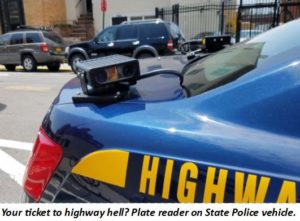 Governor Andrew M. Cuomo announced that on Saturday, September 30, installation of cashless tolling on all the MTA bridges and tunnels would be completed. What could be objectionable about efficiently and electronically collecting tolls without slowing traffic? In fact, MoveNY’s midtown town toll collection scheme is predicated on widespread application of this technology to create a ring of cashless tolls on the East River crossings and across Manhattan south of Central Park (not on the west side, though, giving NJ tunnel users a pass). Says the New York Times: “By making toll-collecting all but invisible, (Governor) Cuomo hopes congestion pricing will be more politically viable this time around.” The New York Times.
Governor Andrew M. Cuomo announced that on Saturday, September 30, installation of cashless tolling on all the MTA bridges and tunnels would be completed. What could be objectionable about efficiently and electronically collecting tolls without slowing traffic? In fact, MoveNY’s midtown town toll collection scheme is predicated on widespread application of this technology to create a ring of cashless tolls on the East River crossings and across Manhattan south of Central Park (not on the west side, though, giving NJ tunnel users a pass). Says the New York Times: “By making toll-collecting all but invisible, (Governor) Cuomo hopes congestion pricing will be more politically viable this time around.” The New York Times.
The thing about cashless tolling, however, is that it’s nice when it works, but hell when it doesn’t. With cashless tolling, there are plenty of opportunities for errors when the data is shared between the tolling authorities, the contractors that install and maintain the transponders, E-ZPass (a private company that administers the data and collections) and the various state DMV’s that maintain the registration information and can suspend registrations if notified that tolls and fines are unpaid.
Add to the mix people who don’t have E-ZPass accounts, max out on their credit cards, or don’t advise the DMV when they move, and it can become a nightmare.
Attorney Arthur Miller, co-publisher of newyorktruckstop.com, has seen a steady rise in E-ZPass problems for fleet operators and individuals within the 16 state, 37 authority, E-ZPass consortium. Notices are supposed to be sent for unpaid tolls, or tolls that did not successfully attach to the motorist’s E-ZPass account. Then, if unpaid, late penalties accrue, up to $100 for each unpaid toll. Once a vehicle accumulates too many unpaid tolls and penalties, the tolling authority will either go to a collection agency or ask the registrant’s DMV to suspend the registration. Here in NY, a regulation permits the DMV to suspend of the registration of vehicles with three or more unpaid tolls and violation fees, or for commercial vehicle owners with $200 or more in unpaid tolls and violation fees within a period of five years. Repeated notices are supposed to be sent before any suspension. But Miller has seen several instances where the first notice the vehicle owner received was when law enforcement impounded the vehicle for a suspended registration. Incorrect addresses or failure to actually send notices are often to blame.
E-ZPass (the collection company) says it has no authority to negotiate or reduce tolls or penalties. They defer to the individual tolling agencies for that. The degree of cooperation widely differs between agencies. Some have departments to handle such issues. Others hide behind layers of administrative muck to avoid any public contact. Their data must be right, of course.
What’s missing in the system is effective public oversight of these quasi-public and private agencies, representatives at each agency who can drill into the data and negotiate claims, and opportunities for fair hearings on disputed charges with constitutionally guaranteed rights of due process and equal protection.
To best protect yourself, and your fleet, from E-ZPass surprises on the road, here are a few things you can do:
- Make sure you have E-ZPass tags for each vehicle and that the accounts are up to date.
- Check your E-ZPass accounts regularly for errors.
- Make sure that your method of payment is current. If your credit card on file has expired or maxed out, replace it. If the account balance is low, add to it.
- Set up e-mail alerts with E-ZPass.
- Make sure the DMV has your correct mailing address. They can’t send you a notice if they have an old address.
- No E-ZPass? If you went through a cashless tolling facility but are waiting for the bill, keep calling E-ZPass at 1-800-333-8655 (TOLL). The E-ZPass website does not permit a search for unpaid tolls without a bill number. One cannot search by plate alone. If you never receive an invoice, to avoid surprises you must call to find out if any money is due.
These issues must be addressed before further expansion of cashless tolling or adopting congestion pricing.
Leave a Reply